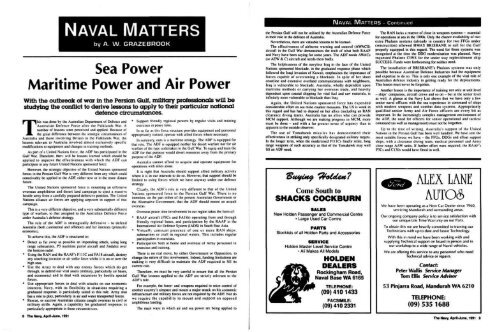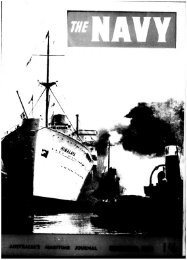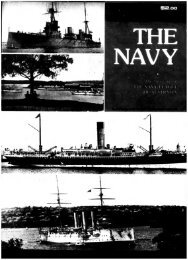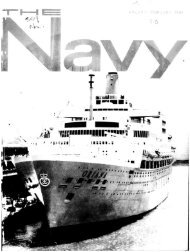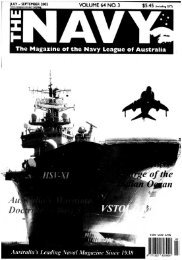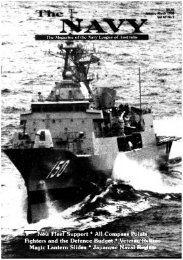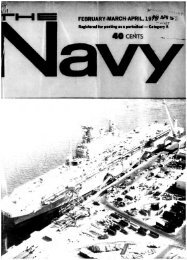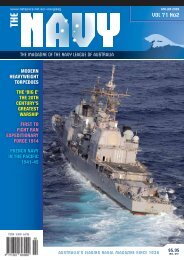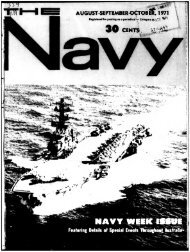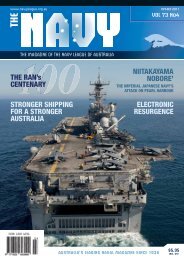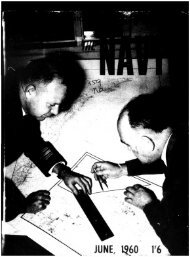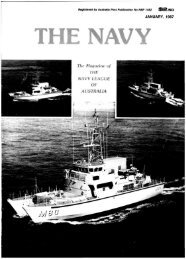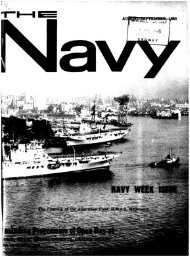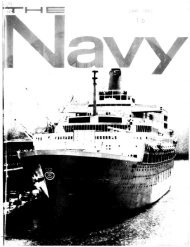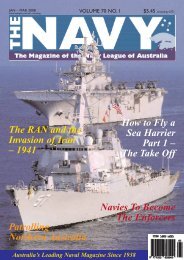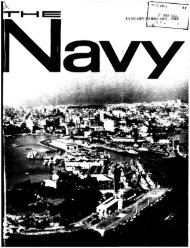Jan and Apr 1991 - Navy League of Australia
Jan and Apr 1991 - Navy League of Australia
Jan and Apr 1991 - Navy League of Australia
You also want an ePaper? Increase the reach of your titles
YUMPU automatically turns print PDFs into web optimized ePapers that Google loves.
NAVAL MATTERS<br />
by A. W. GRAZEBROOK<br />
Sea Power<br />
Maritime Power <strong>and</strong> Air Power<br />
With the outbreak <strong>of</strong> war in the Persian Gulf, military pr<strong>of</strong>essionals will be<br />
studying the conflict to derive lessons to apply to their particular national<br />
defence circumstances.<br />
T<br />
his was done by (he <strong>Australia</strong>n Department <strong>of</strong> Defence <strong>and</strong><br />
<strong>Australia</strong>n Defence Force after the Falkl<strong>and</strong>s War. A<br />
number <strong>of</strong> lessons were perceived <strong>and</strong> applied. Because <strong>of</strong><br />
the great difference between the strategic circumstances <strong>of</strong><br />
<strong>Australia</strong> <strong>and</strong> those involving Britain in the Falkl<strong>and</strong>s War. the<br />
lessons relevant 10 <strong>Australia</strong> involved almost exclusively specific<br />
modifications to equipment <strong>and</strong> changes in training methods.<br />
As part <strong>of</strong> a United Nations force, the ADF has participated in the<br />
Gulf War. Therefore, thcr.- will be lessons learned which should be<br />
applied to improve the effectiveness with which the ADF can<br />
participate in any future United Nations sponsored force.<br />
However, the strategic objective <strong>of</strong> the United Nations sponsored<br />
forces in the Persian Gulf War is very different from any which could<br />
conceivably be applied to the ADF. cither now or in the more distant<br />
future.<br />
The United Nations sponsored force is mounting an <strong>of</strong>fensive<br />
overseas amphibious <strong>and</strong> desert l<strong>and</strong> campaign to eject a massive<br />
hostile army from a carefully prepared defensive position. The United<br />
Nations alliance air forces are applying airpower in support <strong>of</strong> that<br />
campaign.<br />
This is a very different objective, <strong>and</strong> a very substantially different<br />
type <strong>of</strong> warfare, to that assigned to the <strong>Australia</strong>n Defence Force<br />
under <strong>Australia</strong>'s defence strategy.<br />
The role <strong>of</strong> the ADF is strategically defensive - to defend<br />
<strong>Australia</strong> (both continental <strong>and</strong> <strong>of</strong>fshore) <strong>and</strong> her interests (primarily<br />
economic >.<br />
To achieve this, the ADF is structured to:<br />
* Detect as far away as possible an impending attack, using long<br />
range submarines. P3 maritime patrol aircraft <strong>and</strong> Jindalcc over<br />
the horizon radar.<br />
* Using the RAN <strong>and</strong> the RAAF's Fl I \C <strong>and</strong> FAI8 aircraft, destroy<br />
any attacking invasion or air strike force whilst it is on or over the<br />
high seas.<br />
* Use the Army to deal with any enemy forces which do get<br />
through, to defend our vital assets (military, particularly air bases,<br />
<strong>and</strong> economic) <strong>and</strong> to deal with incursions by hostile special<br />
forces.<br />
* Use appropriate forces to deal with attacks on our economic<br />
interests. <strong>Navy</strong>, with its flexibility in situations requiring a<br />
graduated response, is particularly suited to this role. Army also<br />
has a role to play, particularly in air <strong>and</strong> water transported forces.<br />
* Rescue, or succour <strong>Australia</strong>n citizens caught overseas in civil or<br />
military strife. Again, a capability for graduated response: is<br />
particularly appropriate in these circumstances.<br />
8 The <strong>Navy</strong>, <strong>Apr</strong>il-June, <strong>1991</strong><br />
• Support friendly regional powers by regular visits <strong>and</strong> training<br />
exercises in peace time.<br />
In so far as this force structure provides equipment <strong>and</strong> personnel<br />
appropriately trained, operate with allied forces where necessary.<br />
In summary, ours is a maritime strategy. The ADF is equipped for<br />
that role. The ADF is equipped neither for desert warfare nor for air<br />
warfare <strong>of</strong> the type undertaken in the Gulf War. To equip <strong>and</strong> train the<br />
ADF for that purpose would divert resources away from the primary<br />
purpose <strong>of</strong> the ADF.<br />
<strong>Australia</strong> cannot afford to acquire <strong>and</strong> operate equipment for<br />
operations with allies alone.<br />
It is right that <strong>Australia</strong> should support allied military activity<br />
where it is in our interests to do so. However, that support should be<br />
limited to using forces which we have anyway under our defence<br />
strategy.<br />
Clearly, the ADF's role is very different to that <strong>of</strong> the United<br />
Nations sponsored force in the Persian Gulf War. There is no<br />
intention, on the part cither <strong>of</strong> the present <strong>Australia</strong>n Government or<br />
the Alternative Government, that the ADF should mount an assault<br />
overseas.<br />
Overseas peace time involvement in our region takes the form <strong>of</strong>:<br />
* RAAF aircraft (P3Cs <strong>and</strong> FA18s) operating from <strong>and</strong> through<br />
friendly regional bases, <strong>and</strong> participation by the RAAF in the<br />
International Air Defence System (IADS) in South East Asia.<br />
• Virtually consunl presence <strong>of</strong> one or more RAN ships.<br />
submarines or craft in regional waters. This includes regular<br />
participation in exercises.<br />
* Participation both at home <strong>and</strong> overseas <strong>of</strong> Army personnel in<br />
exercises <strong>and</strong> training.<br />
There is no real move, by either Government or Opposition, to<br />
change the nature <strong>of</strong> this involvement. Indeed, funding limitations arc<br />
making it very difficult lo maintain the ADF required to fill its<br />
current role.<br />
Therefore, we must be very careful to ensure that all the Persian<br />
Gulf War lessons applied to the ADF arc strictly relevant to the<br />
ADF's role.<br />
For example, the force <strong>and</strong> weapons required lo seize control <strong>of</strong><br />
another country's airspace <strong>and</strong> mount a major attack on his economic<br />
infrastructure <strong>and</strong> military forces are not required by the ADF. Nor do<br />
we require the capability to mount <strong>and</strong> support an opposed<br />
amphibious l<strong>and</strong>ing.<br />
The main ways in which air <strong>and</strong> sea power are being applied to<br />
the Persian Gulf will not be utilised by the <strong>Australia</strong>n Defence Force<br />
in their role in the defence <strong>of</strong> <strong>Australia</strong>.<br />
Nevertheless, there are valuable lessons to be learned.<br />
The effectiveness <strong>of</strong> airborne warning <strong>and</strong> control (AWACS)<br />
aircraft in the Gulf War demonstrates the truth <strong>of</strong> what both RAAF<br />
<strong>and</strong> <strong>Navy</strong> have been saying for some years. The ADF needs AWACs<br />
(or AEW & C) aircraft <strong>and</strong> needs them badly.<br />
The helplessness <strong>of</strong> the navylcss Iraq in the face <strong>of</strong> the United<br />
Nations sponsored blockade, in the graduated response phase which<br />
followed the Iraqi invasion <strong>of</strong> Kuwait, emphasises the importance <strong>of</strong><br />
forces capable <strong>of</strong> overcoming a blockade. In spite <strong>of</strong> her short<br />
coastline <strong>and</strong> extensive overl<strong>and</strong> communications with neighbours.<br />
Iraq is vulnerable to blockade. <strong>Australia</strong>, wholly dependent upon<br />
maritime methods or carrying her overseas trade, <strong>and</strong> heavily<br />
dependent upon coastal shipping for vita) fuel <strong>and</strong> raw materials, is<br />
infinitely more vulnerable to blockade than Iraq.<br />
Again, the United Nations sponsored force has expended<br />
considerable effort on sea mine counter measures. The US is week in<br />
this regard <strong>and</strong> has had to depend on her allies (including an RAN<br />
clearance diving learn). <strong>Australia</strong> has no allies who can provide<br />
MCM support. Although we are making progress in MCM, more<br />
must be done - <strong>and</strong> with a far greater sense <strong>of</strong> urgency than is<br />
apparent to the outside observer.<br />
The use <strong>of</strong> Tomahawk missiles has demonstrated their<br />
effectiveness in striking only specifically designated military targets.<br />
In the longer term, when the modernised Fl I ICs finally retire, long<br />
range weapons <strong>of</strong> such accuracy as that <strong>of</strong> the Tomahawk may well<br />
fill an ADF need.<br />
Come South to<br />
SHACKS COCKBURN<br />
SALES<br />
New Holden Passenger <strong>and</strong> Commercial Centre<br />
• Large Used Car Centre<br />
PARTS<br />
Stockists ol all Holden Paris <strong>and</strong> Accessories<br />
SERVICE<br />
Holden Master Level Service Centre<br />
• All Makes All Models<br />
HOLDEN<br />
DEALERS<br />
Rockingham Road,<br />
Naval Base WA 6165<br />
NAVAL MATTE RS - Continued<br />
TELEPHONE:<br />
(09)4101433<br />
FACSIMILE:<br />
(09)410 2331<br />
The RAN lacks a reserve <strong>of</strong> close in weapons systems - essential<br />
for operations at sea in the 1990s. Only the chance availability <strong>of</strong> two<br />
extra Phalanx systems (already in country for two FFGs under<br />
construction) allowed HMAS BRISBANE to sail for the Gulf<br />
properly equipped in this regard. The need for these systems was<br />
recognised at the time the DDG modernisation was planned. <strong>Navy</strong><br />
requested Phalanx CIWS for the under way replenishment ship<br />
SUCCESS. Funds were forthcoming for neither need.<br />
The installation <strong>of</strong> BRISBANE'S Phalanx systems was only<br />
possible because <strong>Australia</strong>n Defence Industries had the equipment<br />
<strong>and</strong> expertise to do so. This is only one example <strong>of</strong> the vital role <strong>of</strong><br />
<strong>Australia</strong>n defence industry in getting ready for the deployments.<br />
This lesson must never be forgotten.<br />
Another lesson is the importance <strong>of</strong> training not only at unit level<br />
- ships' companies, aircraft crews <strong>and</strong> so on - nut at the senior level<br />
as well. A glance at the <strong>Navy</strong> List shows thai we have only a few<br />
senior naval <strong>of</strong>ficers with the sea experience in comm<strong>and</strong> <strong>of</strong> ships<br />
with modern weapons <strong>and</strong> combat data systems. Appropriately<br />
qualified senior Army <strong>and</strong> Air Force <strong>of</strong>ficers are every bit as<br />
important. In the increasingly complex management environment <strong>of</strong><br />
the ADF. the need for <strong>of</strong>ficers for senior operational <strong>and</strong> tactical<br />
comm<strong>and</strong> (as well as management) must not be forgotten.<br />
Up lo the lime <strong>of</strong> writing. <strong>Australia</strong>'s support <strong>of</strong> the United<br />
Nations in the Persian Gulf has been well h<strong>and</strong>led. Wc have sent the<br />
most suitable forces wc have - the FFGs. DDGs <strong>and</strong> afloat support<br />
ships, with a clearance diving team, medical personnel <strong>and</strong> Army<br />
close range AAW units. If further effort were required, the RAAF's<br />
P3Cs <strong>and</strong> CI 30s would have fitted in well.<br />
ALEA LANE<br />
AUTOS<br />
We haw been operating as a New Car Dealer since I960,<br />
servicing M<strong>and</strong>urah <strong>and</strong> surrounding areas.<br />
Our ongoing company policy is to service satisfaction with<br />
our unique Life Time Warranty on our Parts.<br />
To obtain this we are heavily committed to training our<br />
Technicians with up (o date <strong>and</strong> future Technology.<br />
With this in mind we have been working with <strong>and</strong><br />
supplying Technical support on board in person <strong>and</strong> in<br />
our workshop to a wide range <strong>of</strong> Naval vehicles.<br />
We are <strong>of</strong>fering this service to any personnel who need<br />
Technical advice or repairs.<br />
Contact:<br />
Peter Wallis Service Manager<br />
Tom Ellis Service Advisor<br />
53 Pinjarra Road, M<strong>and</strong>urah WA 6210<br />
TELEPHONE:<br />
(09)535 1688<br />
TheN«vy. <strong>Apr</strong>ll.June. <strong>1991</strong> 9


